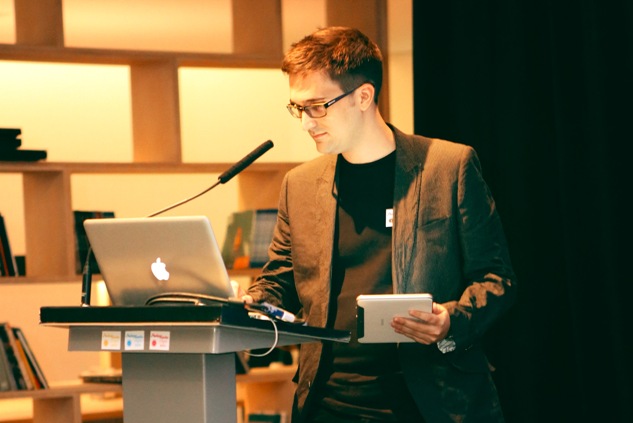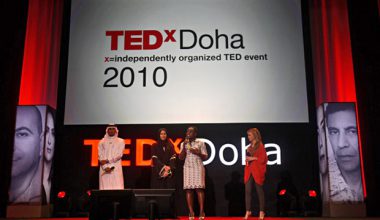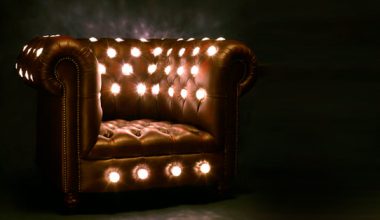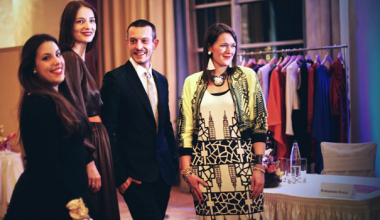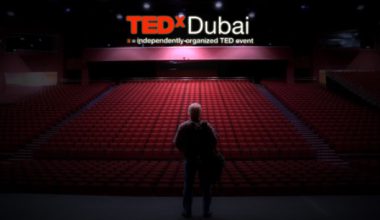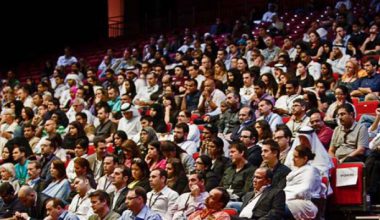
Pecha Kucha Night’s 11th Dubai edition was held in the Pavilion Downtown Dubai on May 26 under the sponsorship of Traffic, the Third Line Gallery and S*uce. Entering the Pavilion one could hear a cacophony of instruments being tuned and people buzzing with conversation as they made their way to their seats.
Emceed by Simone Sebastian, the creative mind behind DiscoBallBreaker, BRAG and Satellite Voices, Pecha Kucha featured nine presenters who were as eclectic as the crowd, coming together from various areas of the world to share their experiences from disciplines that ranged from urban art and fashion to architectural practice and musical prowess.

Pecha Kucha was first inaugurated in Tokyo in 2003 as an interactive multimedia forum that would provide young designers with a platform to discuss their ideas and network with other aspiring talents as well as more established professionals. Devised by Astrid Klein and Mark Dytham of Klein Dytham Architecture, and garnering popularity throughout the world, this cultural event has since spread to 537 cities and is hosted in Dubai three to four times a year. Presentations are open to all, with a focus on sharing creative works and providing presenters with the opportunity to secure the attention of other creatives, soliciting their guidance on how to pursue their projects or the financial support needed to execute them.
Pecha Kucha refers to the sound of chatter in Japanese, and is reflected in the 20 x 20 format of the presentations, which comprise 20 slides, each displayed for 20 seconds as the presenters narrate the concept behind the images shown. The steady and quick pace of the presentations allows for a greater number of presenters to showcase their work in public, some for the very first time, and maintains the audience’s focus on the works. On this night, every two presentations were followed by a brief break, where Sebastian interacted with the crowd, asking them questions about the presentations and handing out accessories to all the winners, courtesy of S*uce.

Vikram Divecha, an artist and advertising professional based in Dubai since 2005, opened the night with a presentation of his project titled Concbots. Divecha’s Concbots are essentially a “robotic fate cast in concrete,” which serve as a social commentary on the urban geometry and architecture of Dubai, and people’s relationship to the elements that constitute this city. He satirically compares these precast concrete “urban figurines” to our precast identities, choosing to celebrate the average hero in fourteen models. Divecha seeks the support of a patron in order to realize his vision of having Concbots produced and sold in design stores, as well as having them constructed and installed as public sculptures within the urban context of Dubai.
Nacho Zamora, a public art researcher, flew all the way from Spain to discuss Solar Artworks, an initiative that aims to raise awareness concerning environmental causes through the design and display of sustainable public works of art. With light exposure throughout the year, Dubai presents the optimal conditions for Solar Artworks, which incorporate innovative technologies such as solar cells, to operate. Zamora seeks to collaborate with architects, designers and potential investors in Dubai to establish a design studio to further develop his vision of constructing these works within this metropolis, which inherently inform the public of the benefits of adopting eco-friendly practices in their own lives.

Steffi Bow, a graffiti artist also known as the Bow Terrorist, spoke of how her spray painted bow tags were inspired by her East London roots as well as a way to commemorate her late grandmother who often wore them. Steffi brought the right dose of lighthearted humor and romance to the evening, recounting her love story with partner Sya One, through a series of photographs of graffiti artworks the couple created together, entitled Graffiti Lovers. Beginning their story in an abandoned parking lot in Dubai’s Festival City where they first met, Steffi takes the audience on an exciting visual journey through their relationship, spraying together in cities around the world from heaven spots in London to backstreets in Beirut. She informs the audience on the difficulty of practicing graffiti in Dubai due to the expense of the spray paint. Steffi’s presentation culminates with the perfect happy ending, once again in the car park with Sya getting down on one knee to propose to her with a fitting beautiful diamond encrusted bow ring.

Tarik Batal launched Today I Can Do Anything, a motivational apparel and accessory company in January 2012. Batal’s product line includes t-shirts, hats, water bottles, tote bags and wristbands, all of which bear the same slogan, serving as an inspirational reminder to believe in and pursue one’s dreams. Batal shares his personal journey in creating the company, with a simple idea growing into a business that has attracted a following of 5000 Facebook users, as well as thousands of consumers with an impressive roster of celebrity names. Twenty percent of proceeds made from online sales are donated to the Children’s Hospital Los Angeles.

Tahir Sultan, a Kuwaiti fashion designer, spoke of pursuing his dream of a career in fashion after studying architecture in Florence. Sultan went on to study Fashion Knitwear at Central Saint Martins in London, followed by working experience with John Galliano and Alexander McQueen, before creating his own namesake label, Tahir Sultan. A self-professed style advocate, Sultan emphasizes personality in his designs and aesthetic. He presents images from his work with an NGO named Ankuri in Dehradun, India, which provides underprivileged women with the opportunity to support their families and themselves through the knitting of garments, some of which have been featured in the pages of Vogue and Harper’s Bazaar. Sultan encouraged the audience to follow their dreams and to contribute to their societies in a meaningful way.
Tima Ouzden, a fashion designer and cultural director, presented twenty facts regarding the DXB Store, launched by Art Dubai in March 2011 as a pop-up store, in collaboration with College of Architecture, Art and Design, the American University of Sharjah. The DXB Store is a not-for-profit space that showcases a collection of limited edition products that range from jewelry and stationery to design collectibles, all of which are designed by artists and designers based in the UAE. This year the DXB Store was based across three venues, Art Dubai in Madinat Jumeirah, Sikka in Albastakiya and Design Days in Downtown Dubai, featuring works by 40 designers from 13 different professions.
![Anarchitect[s] Tarik Al Zaharna and Jonathan Ashmore](http://khaleejesque.wpengine.com/wp-content/uploads/2012/06/Anarchitects-620x772.jpg)
Johnathan Ashmore and Tarik Al Zaharna are architects who work together in an international professional practice in London, Berlin, New York and Dubai. Together they run Anarchitect[s], which serves as a platform for collaborative architecture, design and research projects. In Dubai, they have initiated Archisocial, which is a bimonthly meeting of creative minds, as well as Architectural Programs. The Anarchitect[s]collaborated with Art Dubai and MAKE Business Hub, to develop and execute the design of this year’s DXB Store. Zaharna presented images of the pop-up store, designed as a flexible and manoeuvrable box-like structure, which comprises the acronym DXB, and is able to reconfigure to adapt to its changing context and program.

Siddarth Siva, a Dubai based photographer, and Jamal H. Iqbal, an actor, comic, poet, creative director and writer, collaborate on a project titled pointCounterpoint. This series was created over 15 summer days and comprises 10 diptychs that feature photographs shot by Siva and poems written by Iqbal, exploring the theme of transience as it applies to the people who have moved to Dubai from around the world. The photographs and poems are powerful and moving, speaking to the feeling expats in this city experience living in a continued state of flux, in which they “come, go and come back again.”
The night drew to a close with several musical performances by the Dubai Youth Orchestra, which included both original arrangements and covers of well known songs. Dubai Youth Orchestra is a not-for-profit organization consisting of 35 members from various countries, with ages ranging from 6 to 30 years old. The Orchestra has participated in festivals, concerts, recitals and charity events and seeks to continue performing in cultural events throughout the UAE.
After a standing ovation, an encore was called and the crowd in the Pavilion was sent off to a cover of Fairuz’s Nassam Alayna El Hawa, a song that speaks to a longing for home, a shared feeling amongst those living in Dubai, a home to a Diaspora from a variety of countries.
Pecha Kucha in its eleventh edition made for an exciting cultural evening where creative minds convened to present their inspirations, artistic pursuits and the highlights of their careers.
– Nadine Fattouh
Images courtesy of The Pavilion Downtown Dubai





